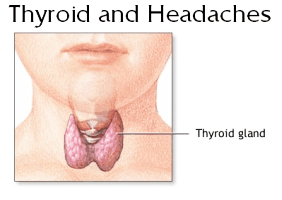Thyroid Headache
On the one hand, the existence of thyroid headache is obvious and intuitive. But once you start looking into treatment, things get more interesting.
The thyroid is a part of the endocrine system, a system which puts regulated amounts of hormones in the body. We often think about the relationship between reproductive hormones and migraine, but there are many changes in the body which can trigger migraine attacks, or which can be related to other types of headache.
 Anybody – babies, men, women, teens – anyone can have a thyroid dysfunction (the symptoms can be different – see this example of hypothyroidism). There are various types of dysfunction, though the most common is hypothyroidism – an underactive thyroid.
Anybody – babies, men, women, teens – anyone can have a thyroid dysfunction (the symptoms can be different – see this example of hypothyroidism). There are various types of dysfunction, though the most common is hypothyroidism – an underactive thyroid.
Sometimes headaches, often tension-type headaches, will progress right along with problems with your thyroid. A properly treated thyroid condition will clear up the headaches as well.
But thyroid and headaches can have a more complicated relationship. Just because you have a thyroid condition and headache, doesn’t mean you have thyroid headache. Thyroid problems can also be comorbid with headache and migraine. That means that someone with a thyroid condition is more likely to also have migraine, or tension-type headache. Treating the thyroid condition may be a part of the solution. But although the diseases may be related, and even have a common basis, they may need to be treated independently.
Should I be Concerned about Thyroid Headache?
Although many doctors may present diagnosis and treatment of conditions such as hypothyroidism as an open-and-shut case, it’s not always so easy for someone struggling with headaches. Why?
For one thing, anytime you’re dealing with more than one disease, things can get very complicated. Take for example what Jean, a HeadWay subscriber, wrote:
I have been a sufferer from many years, but since being diagnosed with Hashimoto’s [a form of Hypothyroidism] and subsequent treatment for that, attacks have skyrocketed out of control leading to being hospitalized frequently. Doctors now agree that the thyroid treatment is responsible for these attacks and are really at a loss how to proceed. At the moment I’ve stopped the thyroid treatment which I know can only be a short-term measure…
Yes, it is possible for the treatment to trigger more headache attacks (this may be temporary).
Also, because the thyroid can affect so many parts of the body (and so lead to symptoms such as depression, weight gain, poor concentration, dry skin…), there could be a number of other things causing the symptoms. There is some debate, for example, about the need to do more than just the standard test (a TSH test). Testing free T3 and free T4 may also smoke out related conditions that could be triggering headaches and other conditions.
A number of specialists recommend at the very least the free T3 and free T4 tests along with the TSH test, but even here there is debate about how to interpret the results. If you’re concerned about thyroid and headaches, consider seeing a specialist who has experience treating both.
It is very important for migraine and headache patients to think in terms of whole-body health, because every system in the body is inter-connected. Be aware of, keep track of, and tell your doctor about, “smaller” symptoms that you’re noticing (such as dry skin, heavy menstrual bleeding, difficulty concentrating). These things could help your doctor diagnose something that could have gone unnoticed.
Be aware that what you eat, medications you take, your lifestyle, hormonal changes – all these things could have more of an impact on your health than you realize.
Dr. Robert Cowan says it well in his book The Keeler Migraine Method, talking about “Health Maintenance”:
This catchall phrase gets bandied about a lot in health care circles and the popular press. The concept is quite simple: it means taking care of yourself and not doing stupid things to your body. Of course, this is easier said than done. In addition to the migraineur’s responsibility to be self-aware, vigilant, and mindful of the things that can make headaches worse, health maintenance also simply means living a healthy life. Most headache sufferers report that their headaches get worse when they have the flu or some other chronic illness, but other, more subtle health issues, such as thyroid problems, vision problems, or chronic stress can also exacerbate headaches. Regular checkups with your primary care physician are important for this reason, if not others.
In other words, an important approach – but not always so easy!
For more information
A great overview is this short article on thyroid headache and other migraine/headache connections. For an in-depth overview, check this article from the University of Maryland Medical Center on Hypothyroidism.
For some discussion of free T3 and free T4, check out these articles:
- The Thyroid World’s Queen T3
- Optimum Diagnosis and Treatment of Hypothyroidism With Free T3 and Free T4 Levels
- Low T3 Syndrome I: It’s Not About the Thyroid! (a 5 article series – the complete index is at the bottom of the article)
- Thyroid Tests (an overview)
Also, be sure to check out What Your Doctor May Not Tell You About: Hypothyroidism: A Simple Plan for Extraordinary Results which discusses free T3 and other levels to test, as well as important related topics such as migraine. Also – similar title, different book – the extremely highly rated Living Well with Hypothyroidism: What Your Doctor Doesn’t Tell You… That You Need to Know.
